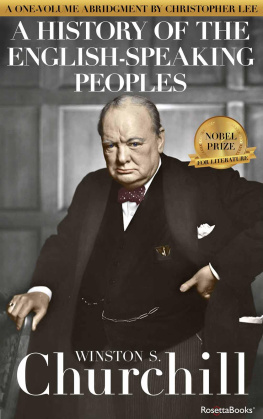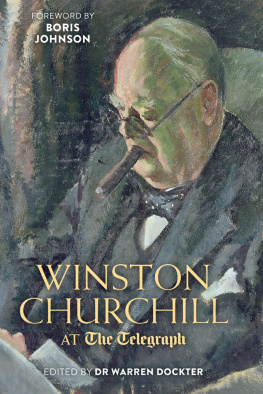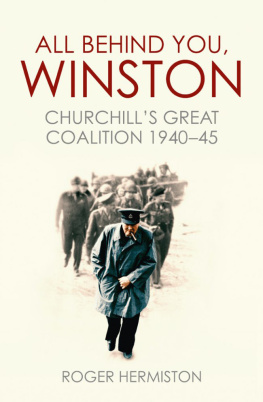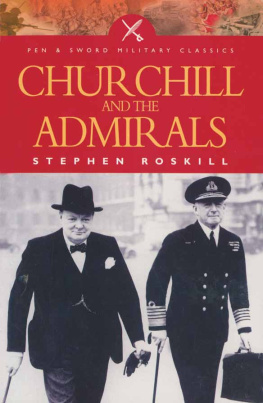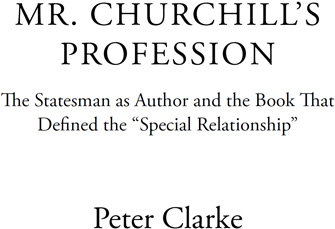
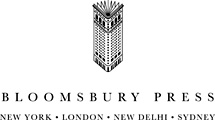
For Mark and Michael, fifty years on
Contents
The Nobel Prize for Literature is the worlds greatest accolade for an author. The roll call of recipients salutes many of the literary giants of the twentieth century and in turn makes it likely that more will be written about them as authors books about books, often piling up by the score or by the hundred. There is one notable exception. Rarely can an authors writings have received less attention than those of the winner of the Nobel Prize for Literature in 1953. This particular Nobel laureates literary achievements have generally received only passing acknowledgement, even though he liked to remind everyone that he had always earned his living by writing. We could call Winston S. Churchill the most famous unknown author of the twentieth century.
This is not because his books were suddenly forgotten after his death in 1965. It is surely because they have long been eclipsed by the authors fame in politics, above all as Britains wartime prime minister and, alongside Roosevelt and Stalin, as one of the Big Three who reshaped our world in the mid-twentieth century. Churchills literary career, by contrast, consumed much of his prodigious energy during the four decades before he and Roosevelt met face to face as leaders of their respective countries in August 1941.
In fact, this was not their first meeting. For Franklin D. Roosevelt, who had visited Britain while serving as Assistant Secretary of the Navy (under President Woodrow Wilson) in World War I, certainly remembered meeting Churchill in 1918. It was at a banquet at Grays Inn, where London barristers meet to dine in the ancient hall; and it is claimed that FDR recollected in later years that he found Churchill a stinker and felt that the British Minister of Munitions was lording it all over us. Thus an embarrassing political lapse was retrospectively amended by the authors well-practised literary artifice.
The name Churchill, it might seem, was simply better known at the time of World War I, whereas the name Roosevelt then usually meant not Franklin but his cousin Theodore, the former president, who died in 1919. The possibilities of confusion, though, are not all on one side. There is an intriguing remark in one of FDRs letters in July 1917: I am just back from lunch with Winston Churchill. He saw the President yesterday and apparently had a very satisfactory talk. No, there had not been an earlier meeting that both men had somehow forgotten. The reference was actually to the American author Winston Churchill: no relation, but, born in 1871, only three years senior to his English namesake. He was to live until 1947. Some of his novels, in their original editions, can still be found in second-hand bookstores, especially in North America often shelved inadvertently in the history and war section. He did not win the Nobel Prize; this book is not about him; it is a salutary tale of the evanescence of fame.
Part One of this book, The Two Careers of Winston S. Churchill, comprises two mainly biographical chapters on his early life. He was first known simply as the son of the late Lord Randolph Churchill, whose brilliant but erratic career as a Tory politician had been cut short, first by his own unforced errors and then by his physical collapse and early death in 1895. Here is the largely political perspective in which his aristocratic heritage is examined in Chapter 1, Fathers Boy. Winstons biography of his father (1906), a monument to filial piety, identified the author as the keeper of the Churchill flame for better or worse. I dislike the father and dislike the son was the reaction of Theodore Roosevelt when he read the book, needlessly adding, so I may be prejudiced. Perhaps the elder Roosevelt and the younger Churchill, so similar in many superficial ways, were simply too competitive, for public attention and literary recognition alike, to admire each other.
Still in his early twenties, the young Winston had already begun his own literary career. Why and how he did so is the theme of Chapter 2, Mothers Boy. In becoming the author of his fortune, Winston was positively encouraged and supported by his American mother, and even the negative impact upon him of her own financial improvidence worked to the same effect, in spurring him on. He was tireless in capitalising on his family connections and his high profile as a controversial war correspondent, determined to get and keep his name before the public. Two books based on his newspaper assignments were published by the time of the authors twenty-fifth birthday (30 November 1899). Moreover, a third was currently appearing in serial form a novel entitled Savrola published in Macmillans Magazine between May and December 1899.
This made for a remarkable literary debut. He wrote later in his memoir My Early Life (titled A Roving Commission in the United States): In the Spring of 1899 I became conscious of the fact that there was another Winston Churchill who also wrote books; apparently he wrote novels, and very good novels too, which achieved an enormous circulation in the United States. I received from many quarters congratulations on my skill as a writer of fiction. I thought at first that these were due to a belated appreciation of the merits of Savrola .
Hence the tongue-in-cheek formality of the transatlantic correspondence that ensued: Mr Winston Churchill presents his compliments to Mr Winston Churchill, and begs to draw his attention to a matter which concerns them both namely that the English Churchill proposed to adopt a formal convention: In future, to avoid mistakes as far as possible, Mr Winston Churchill has decided to sign all published articles, stories, or other work, Winston Spencer Churchill, and not Winston Churchill as formerly. This was all very amicably agreed. It was another good gimmick for publicity. When the two men met in Boston in the following year, it made front-page news in the Boston Herald : Namesakes Meet: Winston Churchills Fast Friends.
The English Churchill duly fulfilled his ambitions as a statesman after some delay. Moreover, throughout his literary career the name that graced his long list of publications was either Winston Spencer Churchill or simply Winston S. Churchill. The initial S. is added, his secretary was still routinely explaining in the 1930s, because this is Mr Churchills distinction from the American author of the same name, whose books appear in England. It would be agreeable to suppose that the American novelist, whenever he happened to see any new volumes in later years, checked that the middle name or initial had duly appeared, in fulfilment of their youthful contract, thus implicitly acknowledging that he was the real Winston Churchill.
Like so much Churchilliana, however, this story seems to have been improved in the telling. A glance at the original editions of his early books will confirm that the English authors name is already given on the title page as Winston Spencer Churchill. Legally, indeed, his family surname was Spencer-Churchill, and had been for over half a century before his own birth. This is the name he answered to at school; he complained unavailingly about his low position in the alphabetical roll call, under S rather than C. Even Liberalism and the Social Problem (1909) the first of many volumes of political speeches carries on the title page the full name Winston Spencer Churchill. Possibly he later opted for his middle initial rather than the full form to avoid any impression that he was adopting a hyphenated name in his political career: the more so since his father had made a famous gibe against upstarts who used double-barrelled names. For in politics Winston was never known as anything but simply Churchill like his father before him.
Next page






